Following a unanimous vote at the Portland City Council in favor of the current plan for the Interstate Bridge Replacement, the Oregon Metro Council voted 6 to 1 to do the same Thursday, with only staunch project critic Mary Nolan in dissent. The vote signals the incredible momentum that this $4-5 billion megaproject has as it heads into its environmental review phase.
The Locally Preferred Alternative (LPA) for the project includes four travel lanes in each direction, including one new “auxiliary” lane, as well as light rail following I-5 into Vancouver.
“Today I will be voting on behalf of BIPOC individuals in communities that I represent who deserve environmental justice in all the decisions that we make, particularly in infrastructure investments as profound and as expensive as this one,” Nolan said ahead of their vote. “Perhaps most importantly, I will be voting on behalf of the young activists who we’ve heard from in the mail and who we heard from today in person…they are pleading with us to leave them with a region and a planet that they can live in, and so I’ll be voting no.”
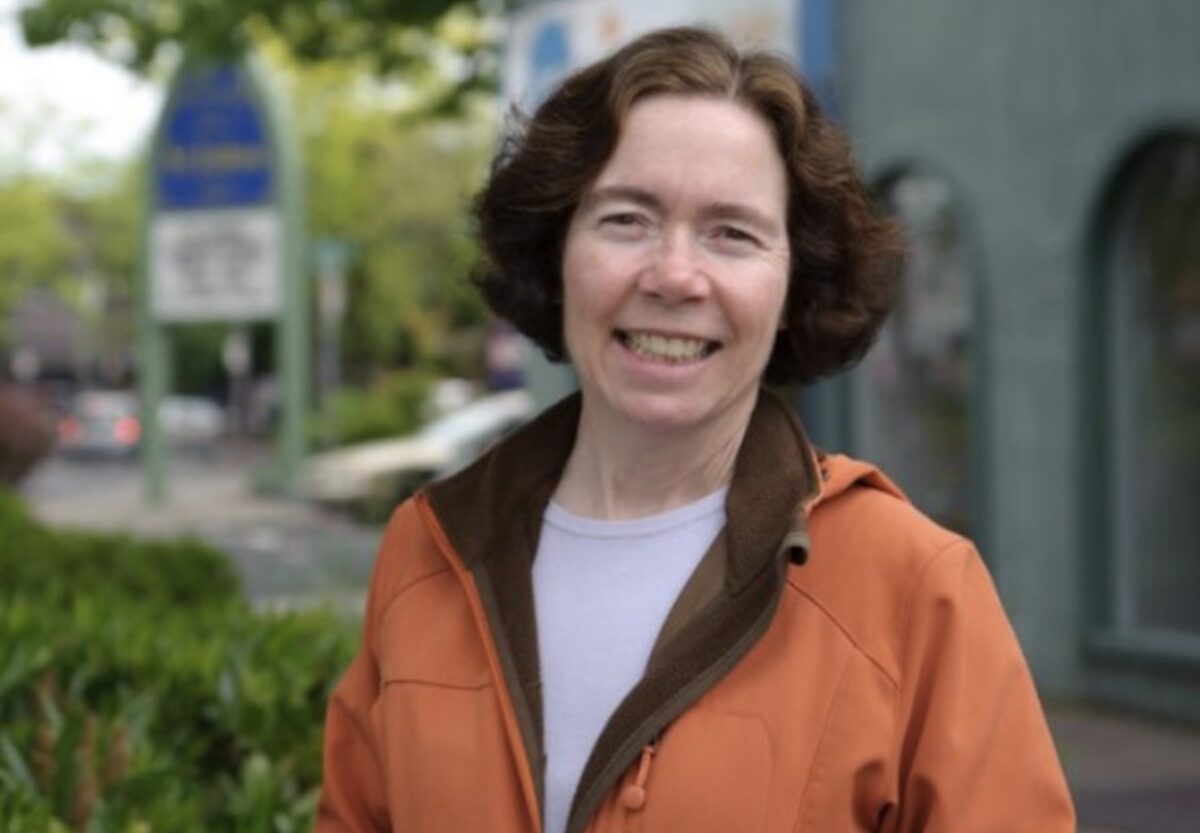
“I will be voting on behalf of the young activists who we’ve heard from in the mail and who we heard from today in person…they are pleading with us to leave them with a region and a planet that they can live in, and so I’ll be voting no.”
– Mary Nolan, Metro councilor
But Nolan’s other potential anti-highway allies on the council suggested that voting “yes” for the LPA was the best way to ensure that the project meets the values that the Metro council is advocating for.
“… compromise is paramount.”
– Juan Carlos Gonzalez, Metro
Juan Carlos Gonzalez, who has been outspoken on the issue of expanding highways in the past, said that the current version of the LPA is the best chance of making a new I-5 between Washington and Oregon a reality. “With this project’s scope and the fact that we’re working with all these partners, compromise is paramount,” he said. Gonzalez joins Portland Commissioner Jo Ann Hardesty as highway-skeptical voices who are framing their embrace of the project as an act that makes it better.
“This decision transforms how we do business by introducing variable rate tolling to influence demand and therefore GHG. The first time Oregon has ever implemented such a policy tool. We are also building Light Rail to provide new high capacity transit to support mode shift,” Gonzalez tweeted in response to criticism from Sunrise PDX following his vote.
Duncan Hwang, who joined the council in January, said he was deferring to the work that his colleagues had done on the bridge in deciding his vote. “While this bridge may not be the bridge that Portland would have built, or that I would have built, an organizing principle I bring to the work is that we live in a world as it is and not as we want it to be,” he said.
But Mary Nolan was the only council member to raise the issue of massive cost overruns that are popping up on other large transportation projects around the region. “ODOT has announced over a billion dollars in cost overruns on projects just within our region. This cannot do anything except add tremendous pressure on the ability of this region to invest in transportation improvements for safety and environmental justice that I think we all need,” Nolan said.
Before the vote to approve the LPA, the Metro Council voted to adopt a set of non-binding “conditions of approval”. New on that list is a demand to create a baseline level of Vehicle Miles Traveled (VMT) and Greenhouse Gas (GHG) emissions and to demonstrate how the project can produce a reduction in both that aligns with the State of Oregon’s climate goals. But several councilors noted how little force and effect this could actually have. “ It’s nice, and it makes us feel good,” Councilor Gerritt Rosenthal said, but that’s about it.
A majority of comments heard before the vote requested a “no” vote, including representatives from Sierra Club Oregon Chapter and the Oregon Environmental Council.
The coalition of orgs seeking to push the project in a positive direction, the Just Crossing Alliance, framed the nearly-unanimous vote as a big setback. “This is a missed opportunity for the region to make good on its climate goals, and hold the IBR team accountable for their lack of transparency and inability to provide decision makers with a viable financial plan or an analysis of the environmental impacts.” said Anna Kahler on behalf of the JCA.
“The IBR project team is repeating the mistakes of the CRC, dooming our region to an unjust, unsustainable and fiscally irresponsible massive bridge project. It is imperative that representatives hold ODOT and the IBR project team accountable to their promises. If the IBR project team and the DOTs refuse to learn from the blunders of the past, our local and state governments must,” she said.
Also among those urging “no” was State Representative Khanh Pham, who told the council that an IBR that isn’t “right sized” means one that is taking away resources from other desperately needed transportation investments. “We need to use the same creativity that our region used when we challenged the Mount Hood Freeway,” Pham said. She wanted the council to hold off approving the project until an investment grade analysis is conducted, something the Just Crossing Alliance is also pushing for.
Pham doesn’t serve on the bi-state legislative committee that will vote to approve the LPA next Thursday. If any “no” votes emerge then, they will likely come from legislators in southwest Washington who are unhappy that there aren’t more added lanes included in the LPA. But now the Locally Preferred Alternative has the seal of approval of Portland, Vancouver (which voted to approve the LPA on Monday), and Metro, so those lawmakers now have much weaker footing to push back on this so-called compromise option.



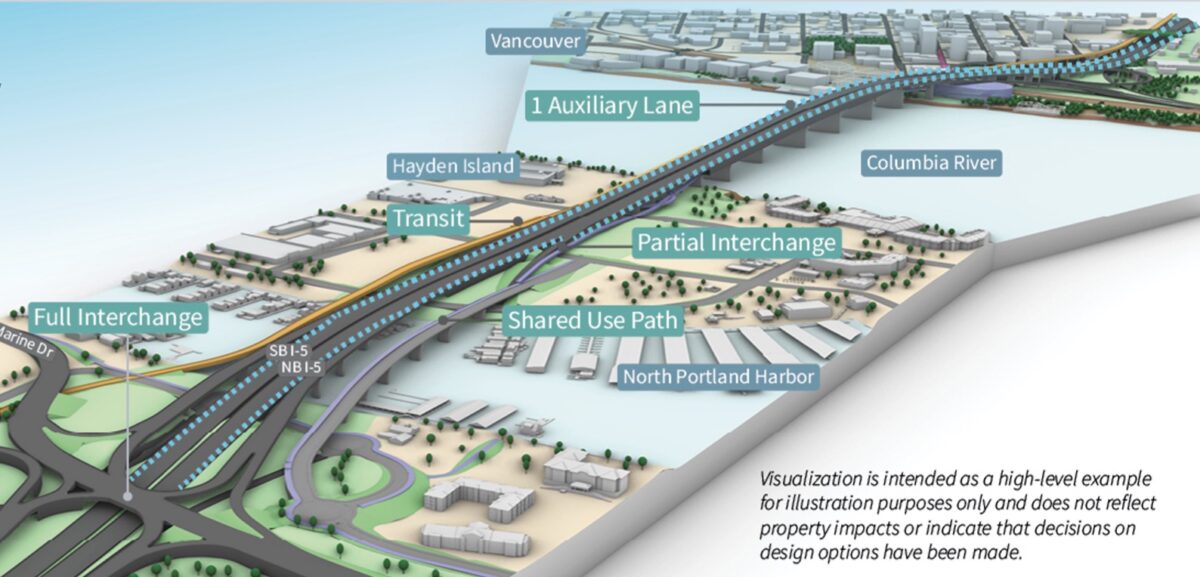
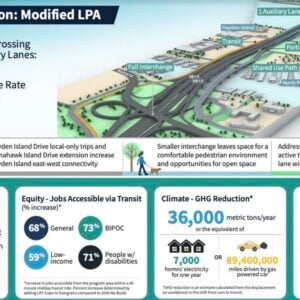
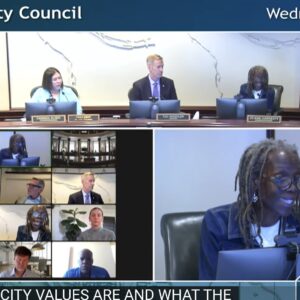

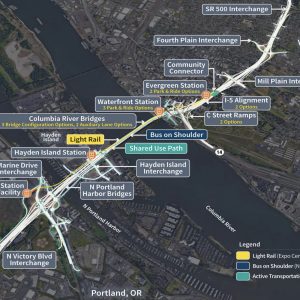
Thanks for reading.
BikePortland has served this community with independent community journalism since 2005. We rely on subscriptions from readers like you to survive. Your financial support is vital in keeping this valuable resource alive and well.
Please subscribe today to strengthen and expand our work.
A classic of the “the best way to achieve our aims is to literally vote against them” genre
Don’t blame me, I voted for Pyszka!
The rest of you… you got what you asked for.
Don’t blame me, I voted for Terri Preeg Riggsby for Metro Councilor, who was quoted in a BP interview saying:
Her responses were really strong on regional transportation.
Me too, Lisa. But the voters picked Duncan Hwang. I almost spit out my coffee when I read his quote about the world we live in vs the world we want to live in. In that case, what the heck are legislators for, anyway?
With the “limited interchange” on Hayden Island pictured above, I’m legitimately curious how someone living on Hayden (or wanting to say, drive to Home Depot for lumber) would access it from the south, and then return to southbound I-5. The local bridge dumps into a bunch of traffic circles on the south side, but none appear to connect to Marine Drive. It looks like they are essentially designing the Hayden interchange for tax-free shoppers from Washington, and completely ignoring Oregon residents and their needs.
In contrast to Portland City Council, which mostly seemed asleep at the wheel yesterday, Metro Council appeared aware it was going to drive off a cliff—and then did it anyway. I think that makes their performance here worse?
Adah Crandall did her homework, calling out Councilor Gonzalez by name, a hint of guilty smile and dawning awareness of hypocrisy animating his face as she drew the connection for him in front of everyone—between the campaign commitment he had made “to not approve a highway expansion project unless it had a clear plan to address climate change and advance racial equity” and a no vote on the LPA, an action he knew he wasn’t going to take. I’ll admit I had reserved some hope for him.
Councilors were told in detail (and said themselves) their conditions of approval were not in any way enforceable, that a yes vote would be approving an LPA entirely unconstrained by their climate conditions. Concerns were raised without reassuring answers on bridge width, the alternatives process, whether this was an improvement over the CRC (which also had tolling and light rail, two things the Councilors seem to be hanging their hats on within this iteration), conflicting conditions of approval between partners on key issues, neither transit agency willing to fund new service, the river crossing type.
The saddest part were the minutes leading up to the vote tally where Councilors seemed to be trying to convince themselves they had listened, considered the evidence and even though they had significant questions and their conditions of approval won’t be able to contain the project, it was still somehow best to move forward without making sure the project could actually be built given significant uncertainties (cost/funding, coast guard), or would have a chance at meeting the outcomes they claim to care about. The whole pile of reluctant-but-willing Councilors slowly built one another up enough to take the plunge together, Nolan looking on. “I wasn’t here, I have to trust past work…I don’t see a path to starting over.” “I want to move forward but don’t want to rush a decision…an extremely reluctant “Aye”” “This is a better project than the CRC.” “I want to operate in an abundance mindset…we can build all of these projects at once.” “This is our best chance.”
-sigh-
Who is actually gonna lead us out of the wilderness on this one?
The over the top rhetoric of some testifying against the project both at the Metro & City of Portland meetings is not helping your cause. “This project is going to kill MILLIONS!” Really? Nobody is taking you seriously when you say stuff like that.
Just like LeBron James likes to criticize his own country of abuses while conveniently ignoring the abuses of China due to the $$$ he receives, climate activists are behaving in a similar hypocritical fashion. Bottom line, the IBR project is not going to kill millions & millions of people. Quit using over the top rhetoric in your testimony. And maybe call out China for a change if you’re so passionate about climate change.
It’s not wrong to say that the climate crisis will kill millions, Fuzzy. It’s already happening.
None other than the WHO says this:
Between 2030 and 2050, climate change is expected to cause approximately 250 000 additional deaths per year, from malnutrition, malaria, diarrhoea and heat stress.
https://www.who.int/news-room/fact-sheets/detail/climate-change-and-health
You starting up your car and driving it across the bridge may not SEEM like it’s causing millions of deaths, but it is – slowly and incrementally. Each of our individual choices drives this catastrophe, enabled by our legislators who build infrastructure that ensures we make certain choices.
If the bridge are not built, would it save a million lives? Of course not. The statement is false, and transparently so.
I am as hawkish on climate change as one can be, but we have to remain tethered to reality.
SunrisePDX also endorsed Ashton Simpson and Duncan Hwang.
And why am I thinking of dogs that herd sheep…
I honestly don’t know what Duncan is thinking with this vote: absolute madness. Ashton didn’t get to vote, so it’s useless to speculate how he would’ve.
Ashton Simpson’s term begins next January. His seat, District 1, is currently represented by Shirley Craddick.
Thanks for the correction. Should have looked this up before commenting.
Duncan Hwang was better than their competitor. I’m sure SunrisePDX would’ve prefered to endorse someone more progressive but there was none.
It’s OK to not endorse.
If I understand Soren at all, “more progressive” isn’t useful in this situation. People get in the room and they listen to the other people in the room and they want to please. Our ecosystem is just a bunch of stuff outdoors. It’s the room that matters.
Since ITOTS (and Build with Joe) wrote long, here’s a paraphrase: We’re screwed.
Withdrawing comment, please don’t approve.
Susan Collins syndrome.
In an attempt at empathy, it is hard to know what information is fed to people in office and what pressure they receive. Who do they see as their constituency?
It’s ironic that a lot of politicians who profess concern about people not yet born are the worst at guarding the ecosystem that will have to provide their calories. Not their polar bears and sequoias, their calories.
Watching this points up another way that our politics is broken. For those not ready to set themselves on fire, what’s left? I guess radical public tax resistance is a possible answer. You would have to give up a lot of stuff but you’d still be alive. They can’t arrest us all.
It’s true we’re only seeing the tip of the sausage-making, to mix metaphors. Robert Liberty, former Metro Councilor hinted in his public testimony at the dynamics you’re referring to, which he summed up as something like “there’s pressure to go along to get along. I know it feels like if you vote No you won’t get invited to junkets or conferences or sit on esteemed panels for projects and you won’t get reelected. That your colleagues sitting next to you will be angry with you and won’t talk to you. But I voted No when it was unpopular to do so and not much changed for me. I got reelected and the Council President later told me they thought I had voted correctly.”
Older politicians may not be able to build infrastructure to support a healthy, low-carbon future for the next generation, but at least they’re putting up some tall structures for us to jump off when the climate catastrophe really gets to spiraling.
This is ten years old now, but most of it still works:
https://bikeportland.org/2011/04/27/video-explains-common-sense-alternative-to-crc-project-52147
A detailed illustration of an alternative design that would in-arguably have the least environmental impact:
Honestly, pretty handsome too.
Am I the only one concerned that the artists rendering doesn’t even have a contiguous non-car line? Also it does some weird loop de loop over hayden island. Hard to think it’s going to be anything but an afterthought, much like the current implementation. Which is awful.
I do like the light rail connection to vancouver, though.